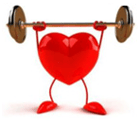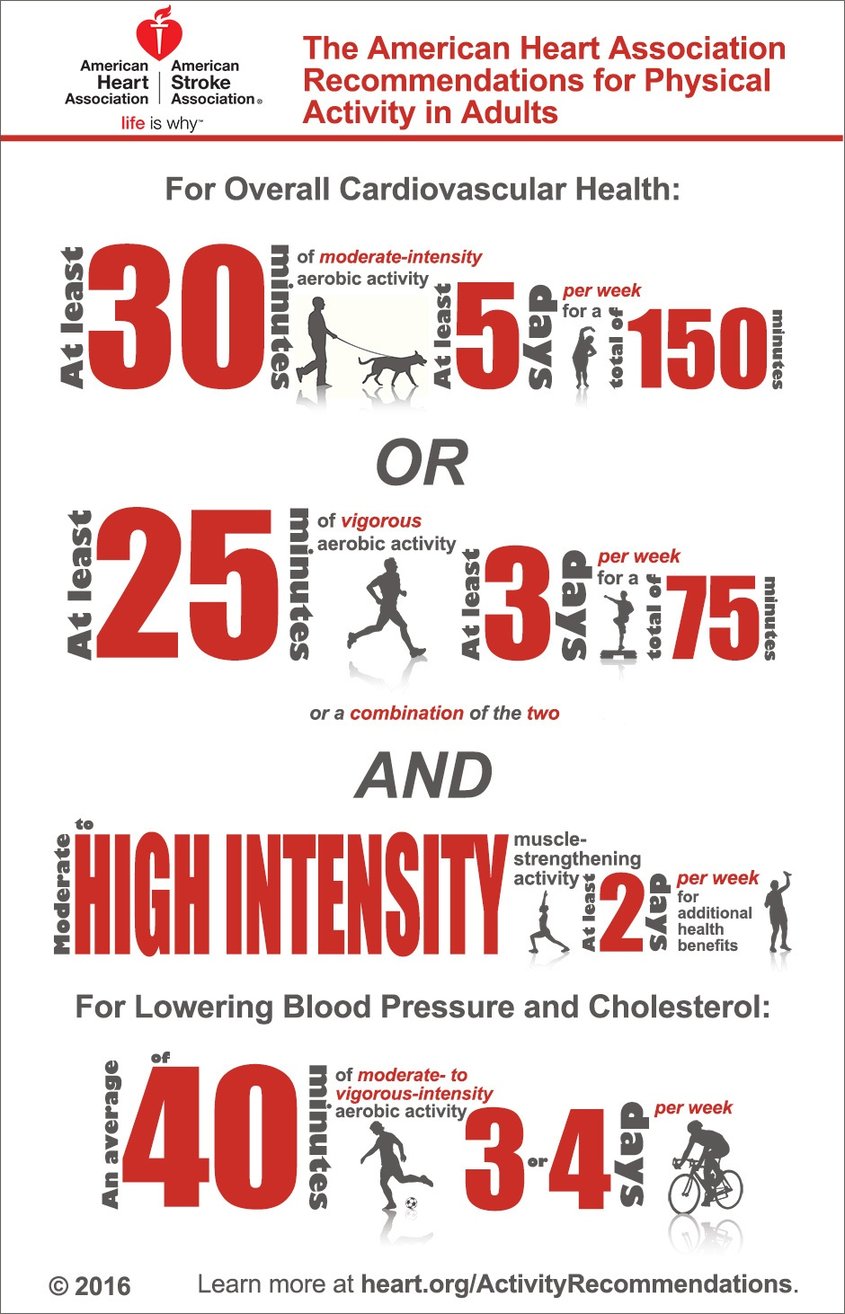Welcome to February, National "Heart Health Month"

At Milestone, of course exercise is important.* To improve overall cardiovascular health, the American Heart Association recommends 75 minutes per week of vigorous aerobic activity or 150 minutes per week of moderate-intensity aerobic activity, in addition to muscle-strengthening activity 2 days per week. (See infographic below.) We invite YOU to get your heart healthy in one of Milestone's 270+ group exercise classes offered weekly! Or, come for a swim in one of our heated pools. If you're not sure where to start, one of our certified personal trainers can help you put together a program. We also have MYZONE screens throughout the facility so you can use a MYZONE heart rate monitor (available for purchase at the Service Desk) to track your heart rate, activity time and calories burned during your workouts. *Be sure to talk with your physician before beginning a new exercise program.
In addition to exercise, there are ways you can eat to promote heart health. Milestone is proud to offer the HMR program, a healthy solutions focused program and ranked the #1 Fast Weight Loss program by U.S. News & World Report 2018. *Be sure to talk with your physician before beginning a new diet regimen or stopping any medication.
Know your heart health risk. We have compiled the following resources for you to be well informed and to keep your heart health at its maximum capacity. While prescription drugs may aid in treating an ailment, researchers have shown that some drugs have the potential to produce harmful effects on the human body. A natural remedy may be a great step in keeping your heart and body healthy, before the need for these drugs arises.
Risk Factors for Heart Attack, Stroke, and Heart Disease
Risk: High Cholesterol
The CDC reported 78 million U.S. adults (nearly 37%) had high enough cholesterol levels that put them at high risk for heart disease and stroke, but what is cholesterol and how does it create this risk? When people talk about cholesterol, there are two types to be aware of: HDL and LDL. LDL are often considered "bad" cholesterol because they can cause a build-up of plaque in your arteries. This plaque build-up often leads to atherosclerosis or the hardening of your arteries. Atherosclerosis is a major cause of heart attacks and strokes in people with high cholesterol because when a piece of the plaque breaks off in your arteries, it can end up blocking blood flow and cause a blood clot. High cholesterol is treatable!
Medication Prescribed:
- Statins are a class of lipid-lowering medication. Although effective in lowering LDL, statins have been linked to muscle pain and damage, liver damage, and memory loss. “Patients who are at risk for diabetes also have a moderate risk of developing diabetes after starting a statin,” according to the Cleveland Clinic.
- Blood thinners prevent blood clots sometimes caused by atherosclerosis from forming or may keep existing blood clots from getting larger. Though blood thinners can save your life, they can also be dangerous. Severe bleeding and even death has been linked to certain blood thinner medications.
Foods that Lower Cholesterol:
- Researchers from Harvard Medical School recommend reducing your LDL by adjusting your diet. Avoid trans fats, saturated fats, and refined sugars & grains.
- Experts at Harvard Medical School suggest eating foods “high in soluble fiber, polyunsaturated fats, which directly lower LDL, and plant sterols and stanols, which block the body from absorbing cholesterol.” These foods include: oats, barley and other whole grains, beans, eggplant, okra, nuts, vegetable oils, apples, grapes, strawberries, citris fruits, foods fortified with sterols and stanols, soy, fatty fish and fiber supplements. Come find a healthy meal or snack at our Milestone Center Cafe!
Risk: High Blood Pressure
When the force of blood pushing against the walls of blood vessels is consistently too high, a person is diagnosed with high blood pressure or hypertension. If the heart and blood vessels are constantly working too hard, they become less efficient. Last Fall, the American Heart Association and the American College of Cardiology released new guidelines for blood pressure readings. According to these new guidelines, over 103 million Americans suffer from hypertension as opposed to 72 million under the previous guidelines. Here at Milestone, you can have a fitness staff member check your blood pressure or you check your own blood pressure anytime with the blood pressure cuff available in the second floor lounge area. With more people living with high blood pressure, let's look at some ways to reduce and prevent high blood pressure.
Medication Prescribed:
- Diuretics help to rid your body of salt and water, lowering the pressure on your blood vessel walls. These are generally safe, though may be prescribed in conjunction with an ACE Inhibitor. This drug prevents the body from producing angiotensin II, an enzyme in the body that narrows your blood vessels, ultimately lowering pressure on the blood vessel walls. ACE Inhibitors have caused a side effect called angioedema, which causes areas of bodily tissues to swell. This can be fatal if the throat tissue swells.
Foods that Lower Blood Pressure:
- The National Heart, Lung, and Blood Institute has funded research trials to explore the DASH diet, a balanced and heart-healthy eating plan. When following the DASH eating plan, it’s essential to choose foods that are low in saturated and trans fats, rich in potassium, calcium, magnesium, fiber, and protein, and low in sodium. The diet encourages foods such as whole grains, nuts, broccoli, carrots, kale, and lean meats. Research has proven that those who followed the DASH diet lowered their blood pressure in just two weeks. Come try a healthy shake at the Milestone Cafe!
Risk: Prediabetes/Diabetes
When your blood sugar is above the normal range, but below the type 2 diabetes threshold, you have a condition known as prediabetes. 90% of adults in America actually have prediabetes and don't know it. This is not a good thing, as prediabetes eventually develops into type 2 diabetes, a chronic health condition that needs constant care. Why are we discussing diabetes along with heart health? The high blood glucose levels of a diabetic can damage the person's blood vessels and the nerves linked to your heart. According to the National Institute of Diabetes and Digestive and Kidney Diseases, "Adults with diabetes are nearly twice as likely to die from heart disease or stroke as people without diabetes." Blood sugar is easy to check with a simple blood test.
Medication Prescribed:
- Metformin helps the body to use insulin more efficiently by improving the sensitivity of body tissues, however, there is an FDA black box warning on this drug. Metformin can lead to a fatal condition called lactic acidosis in which lactic acid builds up in the blood.
Foods that Lower Diabetes Risk:
- Experts recommend meal planning using the glycemic index to avoid blood sugar spikes. Those with prediabetes should eat foods rich in fiber, and avoid processed, fatty, or canned foods. Researchers are also exploring whether there’s a link between having sufficient Vitamin D levels in the blood and blood sugar levels, but this is ongoing. *You should never try to treat diabetes with diet alone.
We hope these general guidelines on exercise and diet have been helpful for you! Please contact us if there is anything we can do to help you! Milestone membership: (502) 233-1500. Personal training: (502) 896-3900 x 115. Service desk: (502) 896-3900 x 110.

*Sources: www.consumersafety.org; www.heart.org; www.diabetes.org; www.cdc.gov; www.myzone.org; www.health.harvard.edu; www.nhlbi.nih.gov


